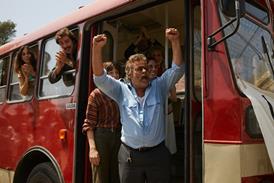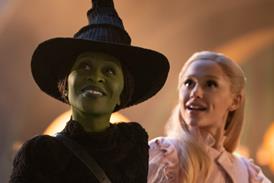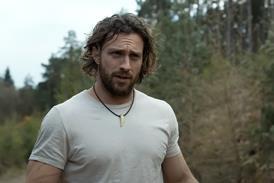Dir. Christoffer Boe.Den. 2005. 88mins.
Christoffer Boe returnsto themes that he explored in his 2003 Camera D'Or winner Reconstructionwith Allegro, a science-fiction feature that focuses on how a person canwipe away their past while still be reliant on trust and faith.
A visually enticing picture,its best chances lie at home in Denmark, where it has just opened. Beyond thatit will need to count on festivals and arthouses to find its way around. Notnecessarily a hard task: Celluloid Dreams has already sold it to Ladyfilm(Italy), Maywin (Russia and the Baltic states) and Alfa (Argentina and Chile)among others.
The story, relayed through adispassionate narrator, centres on Zetterstrom (Thomsen), a perfectionist from anearly age, whose entire life is dedicated to his career as a pianist.
As he is about to enjoy fameand glory so he meets a young woman, Andrea (model Christensen, in her firstlead role); they fall in love, the relationship appears to be perfect, but onenight, when she is supposed to meet him at a concert, she disappears.
Frustrated and unable tocomprehend what has happened, Zetterstrom makes a conscious decision to packhis past away and forget it - shown through an animation sequence - and becomesan eccentric artist, famed for his perfect but soulless art.
Science fiction makes itsentrance in the form of an interviewer who tells Zetterstrom that his past hasbeen captured and kept prisoner in an area of Copenhagen known as the Zone,which has been inexplicably taken over by mysterious forces.
Intrigued, he is eventuallysummoned into the Zone - where no one else has gone before - where heencounters a mysterious man in a wheelchair who introduces himself as Tom(Moritzen). Through him the process of reconstructing Zetterstrom's past inexorablybegins, despite its subject's resistance.
Ultimately he is faced withthe truth behind events that he had previously rejected. Only when he acceptstheir veracity is he capable of going back to music and exploiting his trueartistic potential.
Boe, a superb technician whosuffers from some of his protagonist's cold analytical hang-ups, once againindulges in a style exercise par excellence that fascinates on the surface butultimately feels like much ado about nothing.
Behind the spectacular useof the camera, clever animation sequences, distinct sense of irony and splendidsoundtrack lurks the feeling that Allegro is just a classic session inpsychoanalysis whose purpose is to reveal the patient's past in order to helphim live with the present.
But the answer thatZetterstrom discovers - have faith in other people and allow them to have faithin you if you want your art to be more than self-gratification - has beenbetter explored in the likes of Hal Hartley's Trust.
Thomsen plays Zetterstrom asa bemused, angry and egocentric musician who chooses to ignore the fact thathis music makes sense only when it touches other people. Christensen, in herdebut lead, makes for an attractive, pleasant presence but has little toproject.
Henning Moritzen, as Tom, isas impish as he can be playing someone whose motivations are never quiteelucidated.
A night-time film perexcellence - as if to underline that it is set in the subconscious - Allegrohas some spectacular photography courtesy of Manuel Alberto Claro; editing istight and economical, the animation sequences sparse and sarcastic.
Production companies
Alphaville Pictures Copenhagen
Danish Film Institute
DR TV Danish Broadcasting Corp
SF Film
Nordisk Film & Television Fund
International sales
Celluloid Dreams
Producer
Tine Grew Pfeiffer
Screenplay
Christoffer Boe
Mikael Wulff
Cinematography
Manuel Alberto Claro
Editor
Peter Brandt
Production design
Nikolaj Danielsen
Music
Thomas Knak
Main cast
Ulrich Thomsen
Helena Christensen
Henning Moritzen
Svetoslav Korolev
Niels Skousen
Nicolas Bro
Ellen Hillingso


















No comments yet